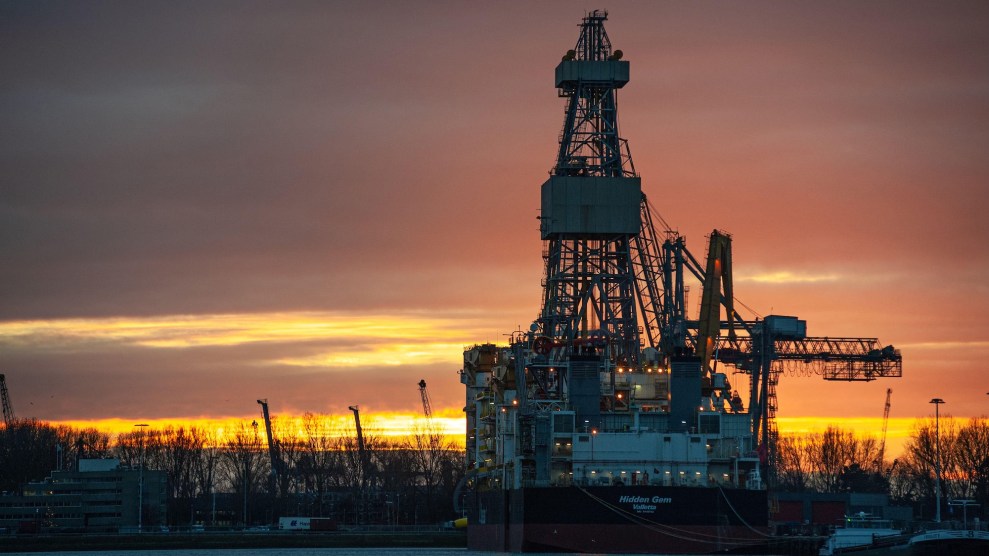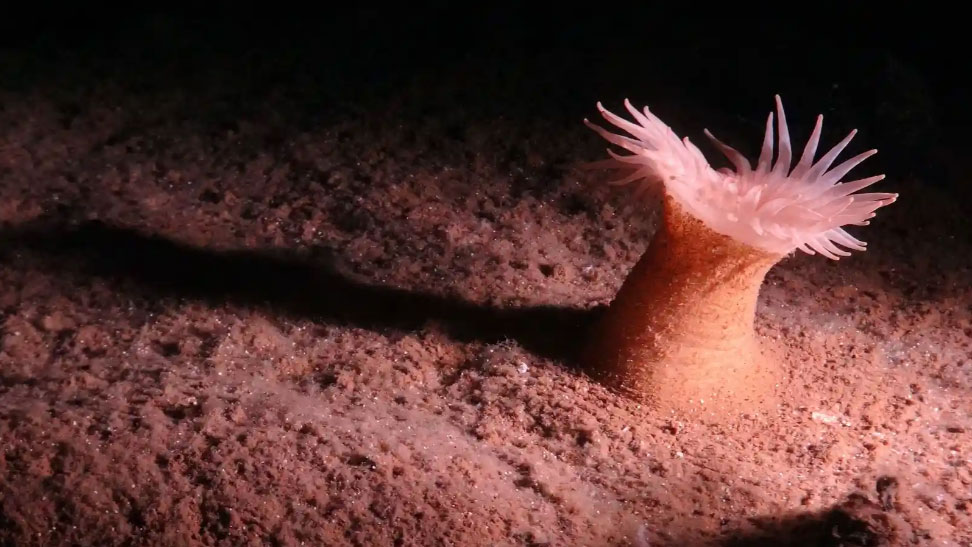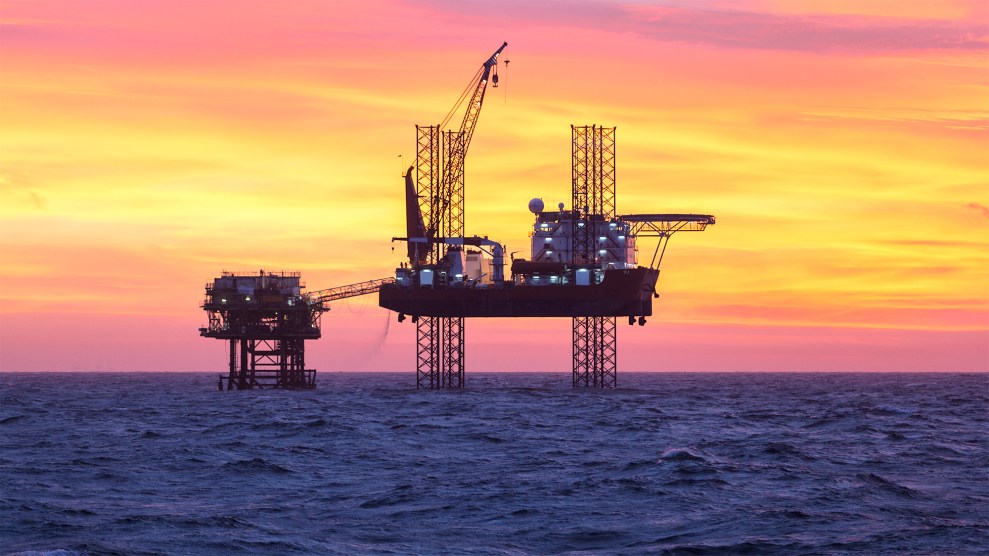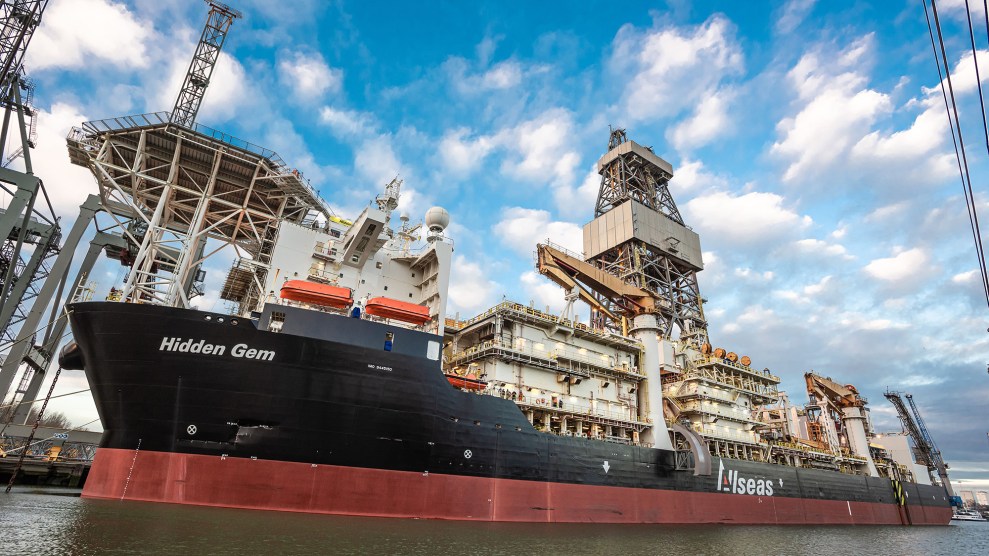
The mining vessel "Hidden Gem," Rotterdam, the Netherlands, February 2022. Charles M. Vella/ZUMA
This story was originally published by the Guardian and is reproduced here as part of the Climate Desk collaboration.
The list of countries calling for a pause on deep-sea mining continued to grow this week ahead of a key moment that mining companies hope will launch the fledgling industry, and its opponents hope could clip its wings, perhaps for good.
Ireland and Sweden became the latest developed economies to join critics, including scientists, environmental organizations, and multinationals such as BMW, Volvo, and Samsung. The carmakers have committed not to use minerals mined from the seabed in their electric vehicles.
No deep-sea mining contracts have yet been authorized, but efforts by the industry and some states, including Norway, have accelerated the race to mine for metals in the planet’s last unexplored frontier.
It is a critical time. With a deadline due to expire on Sunday, commercial applications for deep-sea mining could be given the green light despite the absence of any regulations. From Monday, the International Seabed Authority (ISA), the quasi-UN body in charge of those regulations, will meet in Kingston, Jamaica until July 28 to resume negotiations.
Much is at stake. Scientists have warned of large-scale, severe, and irreversible harm to global ocean ecosystems, already threatened by the climate and biodiversity crises, if deep-sea mining goes ahead. Too little is known about the ocean’s abyss even to draw up regulations, they say.
Last month, the European Academies Science Advisory Council warned of the “dire consequences” for marine ecosystems and against the “misleading narrative” that deep-sea mining is necessary for metals required to meet the transition to a low-carbon economy.
Mining below 200 meters (650 ft) can lead to harmful noise, vibration, and light pollution. There is also the risk of leaks and spills of fuels and other chemicals used in the mining process.
Researchers this year discovered more than 5,000 new species—most of them new to science—living on the seabed in an untouched, mineral-rich area of the Pacific Ocean, known as the Clarion-Clipperton zone, targeted by deep-sea mining firms.
The tiny Pacific island of Nauru is expected to be the first to apply to the ISA to begin mining, although the country has said it won’t sponsor an application on behalf of The Metals Company (TMC) until after the ISA meets this month. Nauru—with a population of about 12,000—triggered the “two-year rule” in 2021 on behalf of Nauru Offshore Resources, a subsidiary of TMC. This request required the authority to complete the mining code by July 9, 2023, or accept mining applications under whatever regulations exist.
Canada-based TMC, formerly known as Deep Green Metals, is partnering with the Pacific states of Nauru, Tonga and Kiribati to explore for deep-sea metals. It has downplayed the impacts and highlighted the need for metals such as cobalt and copper for a transition to clean energy technologies.
That narrative is disputed by some scientists and environmental groups. They point out that such metals are already mined around the world; that lithium, the key mineral used in many batteries, is not widely present in the deep sea; and that electric vehicle technology is constantly changing.
Sweden and Ireland joined a growing list of countries calling for a moratorium, pause, or ban on commercial deep-sea mining. They include Germany, France, Spain, New Zealand, Costa Rica, Chile, Panama, Palau, Fiji, and the Federated States of Micronesia. The French president, Emmanuel Macron, has backed a complete ban. Other countries that have not yet supported a moratorium have nevertheless indicated they will not give approval without first agreeing regulations.
So far, the ISA has allowed companies to explore the deep sea for research purposes only. It has created and adopted regulations to govern 31 exploration contracts, sponsored by 14 nations. As well as Nauru, Tonga, and Kiribati, they include China, Russia, South Korea, India, Britain, France, Poland, Brazil, Japan, Jamaica, and Belgium.
But the failure to establish a regulatory framework for commercial mining before the July 9 deadline triggered by Nauru has thrown the ISA into uncertainty, and means all eyes are on the meeting starting next week.
Many critical issues remain to be addressed within the draft regulations, a long document full of temporary text in brackets and marked in red. According to the NGO Pew Charitable Trusts, the ISA has yet to agree what levels of environmental harm would be considered permissible, what would be the criteria for such harm, and how it would assess liability and assign penalties.
In theory, each of the ISA’s 168 members is involved in its decision making. But in practice, most power lies with a small group of experts known as the Legal and Technical Commission (LTC), made up of lawyers, geologists, and diplomats, with few environmentalists. There is no scientific assessment group to vet applications and no inspectorate to ensure compliance. If the LTC recommends that the council approves an exploitation contract, it can be overturned only by a super-majority of two-thirds of the full council, which comprises 36 states.
Other concerns, particularly among smaller island nations and Indigenous communities, which fear being affected most, include how to share the benefits from mining. There is currently no mechanism to do so. At the last ISA meeting three months ago, the head of Belgium’s delegation, Hugo Verbist, warned the authority was “sleepwalking into a legally uncertain situation.”
This time around, the ISA will address a new proposal by France, Chile, Costa Rica, Palau, and Vanuatu to pause deep-sea mining until all regulations are in place. If passed, it would act as a moratorium but would require approval by a super-majority, or two-thirds, of the 168 assembly members.
William Hague, a former leader of the Conservative party, this week called for Britain to support the moratorium. The UK has so far pushed only for high environmental standards, and said it would not support any exploitation licenses “unless or until” there were enforceable regulations and sufficient evidence to judge the potential impact on deep-sea ecosystems.
Proponents of deep-sea mining have questioned whether a moratorium is even legal for the ISA to institute. Under the UN convention on the law of the sea, which set up the ISA, the authority is charged with regulating mining activities and with protecting the marine environment. However, the treaty also specifies that the seabed and its mineral resources are the “common heritage of mankind”, and part of the ISA’s remit includes equitable sharing of financial benefits.
Despite the opposition, an executive from TMC has said it expects to file an application in the second half of 2023 with the goal of receiving an ISA mining license in 2024. Production would start by the end of that year or early 2025.












